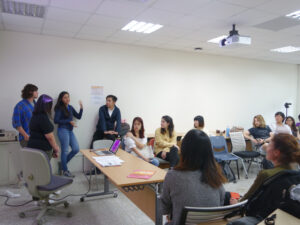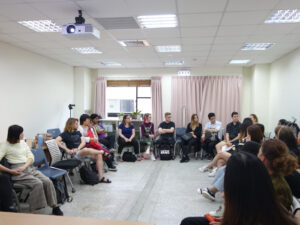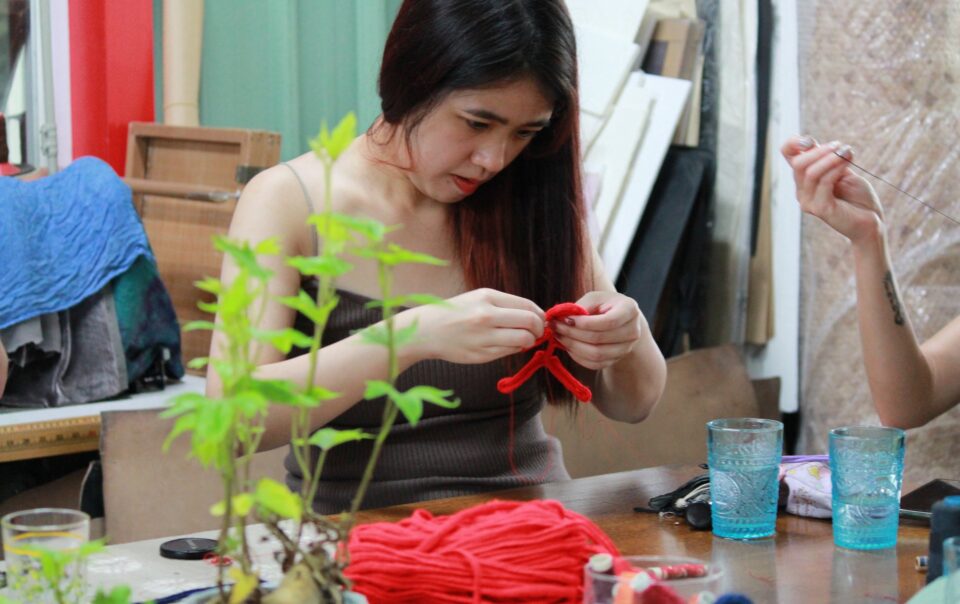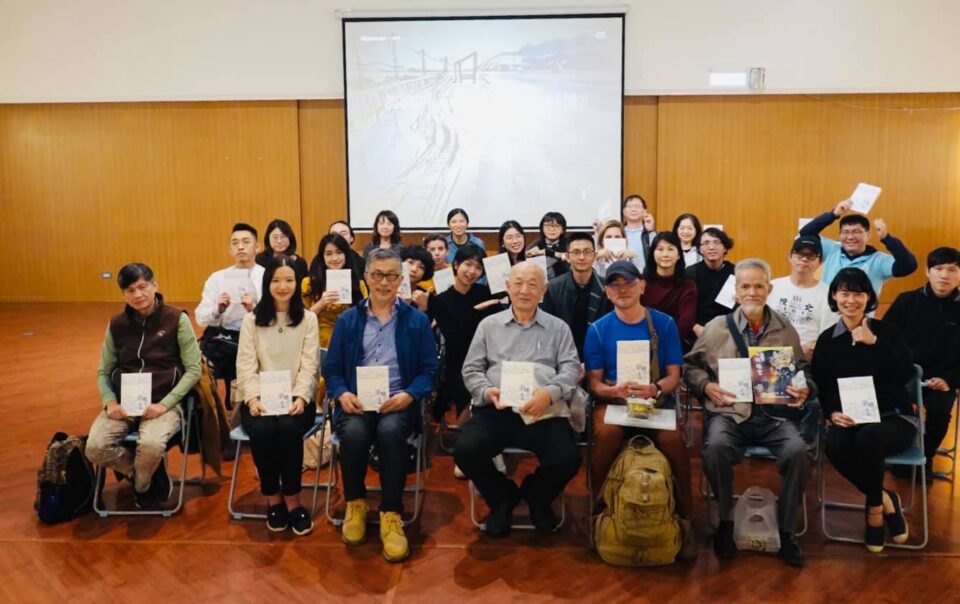Categories
Recent Posts
- Introducing SAC New Faculty Member2025 年 2 月 19 日
- 【Academic Job Vacancy】Full-Time Faculty (Tenure Track)2024 年 4 月 23 日
- Results for the 2024 International Student Admissions2024 年 5 月 22 日
- Introducing SAC New Faculty Member
Academic Cultural Awareness Sharing
An Intercultural Communication Workshop was held between Undergraduate students from the Queensland University of Technology visiting the Taipei National University of the Arts’ students in the IMCCI Program. The Undergraduate students from the University’s Creative Industries Faculty were in Taiwan for a 2 week Creative Industry Study Tour. Their visit to the TNUA Campus was day 4 of their tour which included visits to diverse creative hotspots and industry spaces including museums, art villages and performance spaces across the country. The visit was immersive to say the least, providing an opportunity for cultural, creative and academic exchange as well as networking. The workshop focused on Cultural Awareness and was spearheaded by the students.
First year students in the IMCCI Program were tasked with creating a presentation highlighting observations they made on differences and similarities between their home countries and Taiwan. The presentation highlighted areas of Cultural Policy, Creative Spaces, Indigeneity, Transportation and Food. IMCCI students collaborated to develop a detailed yet succinct presentation that provided an overview of the cultural and creative situations in their countries and contrasted that with what has been observed during their brief stay in Taiwan. The activity opened with introductions, students shared where they came from and what made them come to Taiwan and study Creative Industries. From the variety in response it could immediately be recognized that we all had the similarity of wanting to learn from Taiwan some ways to be more inclusive of the arts and culture.
The directors of each respective program delivered an introduction and overview of what each program entailed. Both programs had students from various backgrounds and interests, and diverse cultures. Allowing opportunity for both groups to contrast their individual educational experience and approach. As well as ask questions about controversial ideas on how to write about culture. This moment of sharing was useful for IMCCI students who have had related discussions on the idea in the context of several classes this semester.
Major points highlighted by IMCCI students about cultural policy was the manner of implementation and for some the lack of such a guideline ever existing. For developing countries if a cultural policy existed, the level of government support for the industry in terms of funding and other resources is limited and for the most part dependent on international and private investors. Whereas in Taiwan the Government provides a great level of support to the industry and the benefits of creativity and culture is employed in all sectors from community designs to education. Creative programming is unending and accessible to all.


photos by Cecile Kao
The students from Queensland were pretty intrigued by the information provided by students on both their countries and Taiwan. In response a short presentation highlighting some of Australian Indigenous history was shared by 2 students from QUT.
Overall it was an enlightening experience for both groups, students in the IMCCI program and Creative Industry Undergraduate alike as they both had an opportunity to interact with cultures, ideas, and creative industry perspectives from across the globe. For IMCCI Students the forum provided information on the background of their peers as well as creative industry in diverse spaces. Coming from both developed and developing countries – from spaces that are sometimes seen as culture and creative industry hubs and leaders to areas that are just beginning to develop an industry and even those working through a revival. The sharing provided content and context for those present. Both groups got an organized glimpse of the global status of creative industries. It also connected with what was being discussed in courses during the semester, providing context on another South East Asian community’s creative industry and indigenous history.
The activity also provided a space for discussion between the students to take place. Which allowed an opportunity for deeper understanding and sharing to occur. Questions surrounding how international students in the program interact with the Taiwanese Creative Industry or how they navigate within the space of the difference were asked. Allowing students to reflect on a deeper level on their experience and how that might influence their understanding of the creative industry in their home countries.
Notable from the presentations was the connection shared between Taiwan and Australia in their indigenous population percentage and history. Like in Taiwan, Australian “Aboriginals” have been provided with some degree of recognition and apologized to by the government. For most of the IMCCI students, Austrailian Indigenous history and creative industry was not a topic we were familiar with, therefore the information shared was of great value. We were also told of ways that Australian Aboriginal art is being monetized in a way that benefits the Aboriginals’ community.
The chance to share with students who like IMCCI Cohort are from different artistic and academic backgrounds was enlightening. Based on the feedback of Australian Students, they too agree that Taiwanese Creative Industry and respect for culture is something to admire and work toward. Perhaps the greatest lesson from the workshop was that the desire for art development and indigenous appreciation is an international phenomenon that goes beyond borders and country classification.
Among the knowledge gained from the session was alternative disciplines that could be combined to develop the creative industry. Seeing the diverse areas of specialization that the QUT students were interested in gave IMCCI students a wider range of areas that could be examined when thinking about research ideas. Additionally, it opened up a new location for us to consider when comparing international creative industries. Having a picture of what the Australian Creative Industry is, gives us yet another perspective on the global situation. For QUT students, the visit perhaps provided an international perspective to creative industries in a Taiwanese context. Giving them a preview of what is happening in both Taiwan and the countries that the Cohort represent. The experience as a whole was inspiring and immensely educational. Most IMCCI student shared that the ideal way to develop what was learned in the workshop would be the opportunity to participate in a similar study tour. This would certainly provide them with much needed field experience in another country. Granting them the opportunity to be exposed to and experience various aspects of another creative industry.
– written by Melody Wagner



